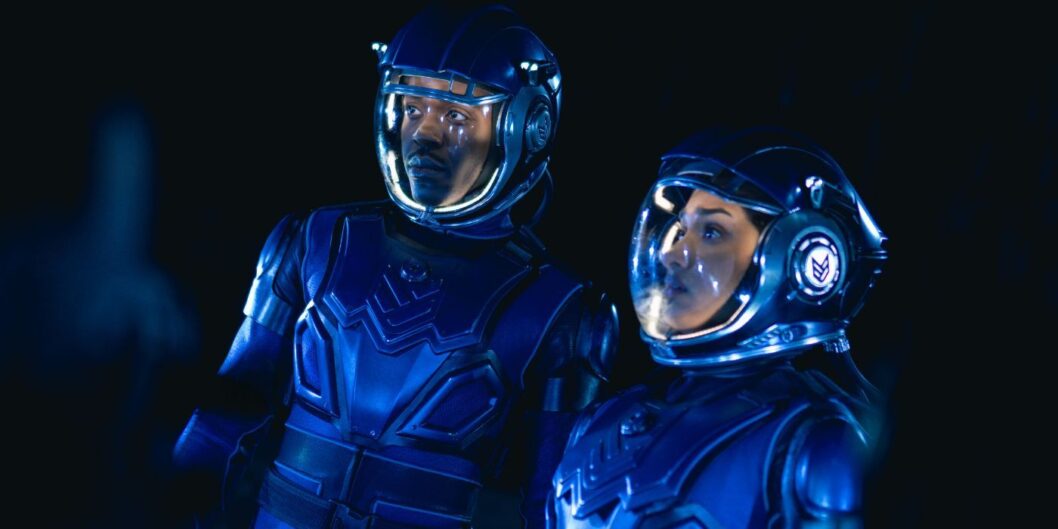Doctor Who Episode "The Well": A Compelling Sequel to "Midnight"
In the latest episode of Doctor Who, titled "The Well," showrunner Russell T. Davies rejuvenates the iconic series by weaving a narrative that serves as both a standalone horror tale and a poignant continuation of the beloved 2008 episode "Midnight." The episode, which has premiered on Disney+, reintroduces the franchise’s longstanding themes while engaging new audiences with a fresh start.
A Setting of Tension and Survival
The episode opens with the Doctor, portrayed by Ncuti Gatwa, and his companion, Belinda (played by Varada Sethu), navigating the TARDIS. Their journey leads them 500,000 years into the future, where they encounter an abandoned mining facility with a dark history. The atmosphere is immediately foreboding, hinted by the dialogue that suggests something is gravely wrong on Earth.
Belinda’s character adds an emotional layer to the narrative. Her longing to reconnect with her family juxtaposes the impending horror, as the Doctor states, "I hope so," when asked if her family is safe. The pair’s camaraderie lays the groundwork for the intensity that soon follows.
An Exploration of Horror
Written by Davies and Sharma Angel Walfall, "The Well" artfully captures the essence of psychological horror. The episode’s pacing starts as a slow burn, allowing the audience to immerse themselves in the tension. As the Doctor and Belinda interact with the military crew on the planet, led by Shaya Costallian (portrayed by Caoilfhionn Dunne), the layers of deceit and danger become more palpable.
The crew discovers a gruesome scene—broken bodies and shattered mirrors bolstering the unsettling atmosphere. The introduction of Aliss Fenley (played expertly by Rose Ayling-Ellis) as the lone survivor provides a deeper narrative thread, revealing a truth that some may find chilling: the creature responsible for the rampant violence is not just a monster but a manifestation of the characters’ fears and paranoia.
A Tension-Filled Climax
Subsequent scenes delve into Aliss’s story, where her defense of a deceased friend resonates powerfully. Yet, it is the entity behind her—connected to a well that holds the key to their survival—that becomes the true antagonist. The disturbing premise is that the creature attaches itself to its victim, feeding off feelings of dread and panic.
A pivotal moment arises when the Doctor realizes that in order to defeat the creature, they need to approach it with restraint and intellect rather than brute force. The action escalates tragically as soldiers begin to succumb to mob mentality, mirroring the chaos presented in "Midnight."
Emotional Sacrifice and Conclusion
The episode reaches its emotional zenith with Shaya’s sacrifice. Her choice to protect Aliss by confronting the creature reveals the themes of heroism and vulnerability that permeate the episode. This heartbreaking decision echoes the sacrifices seen in previous episodes, yet with a deeper emotional resonance due to the character development provided throughout.
Ultimately, as the Doctor and Belinda make their escape, tension remains. The unsettling ambiguity about whether they truly outsmarted the creature lingers, leaving the audience in a state of suspense.
Significance and Future Implications
"The Well" is not just a horror sequel; it is a testament to the heart of Doctor Who. The episode’s exploration of fear, sacrifice, and the nature of humanity reinforces the show’s ongoing relevance. The performances, particularly from Gatwa and Sethu, have garnered praise for adding depth to their characters.
New episodes of Doctor Who drop at 3 AM ET on Disney+ and BBC iPlayer, promising that the series will continue to challenge and engage its audience. As the franchise adapts to a new generation of viewers, the compelling narratives and rich characterizations ensure its legacy endures.
In summary, Doctor Who‘s "The Well" serves as a powerful reminder of the show’s ability to blend horror with humanity, leaving fans and newcomers alike eager for what lies ahead in the cosmos.









